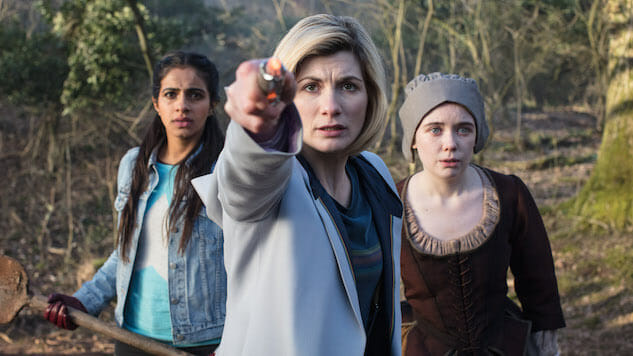Travel Hopefully: On Learning to Love Doctor Who
Photo: Sophie Mutevelian/BBC America
For all of Jodie Whittaker’s ample charms, her Yorkshire accent and elastic expression never far from childlike wonder, I held Doctor Who at arm’s length until near the end of its 848th episode. (To be fair, it was only my eighth—I’d never seen a single installment before this season). In “The Witchfinders,” the series finally, unabashedly embraces the fact that Whittaker, the 13th Doctor, is the first woman to play the role: The episode finds her and her three human companions transported to 17th-century England, where the witch craze has gripped a rural community and the Doctor swiftly becomes a target. As is its wont, Doctor Who mines this dissonance for both laughs (“We’re being patronized to death,” she quips of Alan Cumming’s self-satisfied King James I) and, later, “poetry under pressure,” made not only from rhyming couplets, alliteration, puns, but also from folklore, history, myth. Evil be to him that evil thinks, the King’s garter reads, carrying a faint echo of Sir Gawain and the Green Knight, and the Doctor replies to his smirk with characteristic wisdom, born of more experience than the all the king’s men: “You want to know the secrets of existence?” she asks. “Start with the mysteries of the heart.”
It’s here, spitting mad and still compassionate, that the Doctor, and Doctor Who, seem most themselves—as much about spirit as science, as intent on considering the age-old questions as asking the ones we haven’t thought of yet. It’s here, I mean to say, that the season offers its longest and most piercing glimpse of the classic series I’d heard so much about, the cultural artifact that’s spawned feature film and stage adaptations, novelizations, and museum exhibitions, the franchise that’s inspired such persistent devotion. I’d resisted Doctor Who since the modern revival debuted in 2005, largely on the impression that the series—episodic adventures, a regularly changing lead actor, and decades’ worth of world-building behind it—must be, as too much science-fiction and fantasy is these days, for experts only. With so many moving parts, how could a novice—and a skeptical one, at that—slip into the stream without flailing?
As I wrote of the season finale to Paste’s editor-in-chief and resident Doctor Who aficionado, Josh Jackson, it turns out that the series only appears impenetrable. In fact, once I accepted that the nature of the Doctor herself is among those “secrets of existence”—I’m sorry, “two-hearted Time Lord in the guise of a human” is not an explanation—Doctor Who struck me as refreshingly straightforward, sending its characters on an hour-long caper each week, one they could be relied on to wrap up in time for the closing credits. And with a new star, new companions—Yaz (Mandip Gill), Ryan (Tosin Cole), and Graham (Bradley Walsh)—and new executive producers Chris Chibnall and Matt Strevens, it wasn’t just me starting Who fresh. A number of the early episodes (“The Ghost Monument” and “The Tsuranga Conundrum” in particular) bore the unfortunate mark of the writers finding their sea legs, as if they were still figuring out who this Doctor might be.
-

-

-

-

-

-

-

-

-

-

-

-

-

-

-

-

-

-

-

-

-

-

-

-

-

-

-

-

-

-

-

-

-

-

-

-

-

-

-

-








































